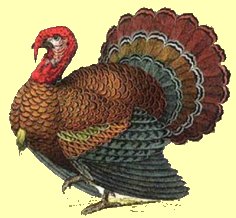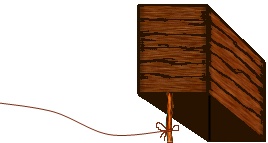The Turkey Trap

picture from Photobucket.com
One day, long ago, there was a certain man who noticed a flock of a dozen wild turkeys who gathered in the same clearing in the woods at about the same time nearly every day. Since times were tough and his family often went hungry, the man decided he would capture those turkeys and his family could eat well for quite a while. So, the man went out into the woods with a large wooden crate, a length of string and the last of the corn and grain his family had for making bread. He turned the crate upside down and used a stick to prop one end of it up off the ground. He next placed a pile of cracked corn and grain under the crate. Finally, he tied a long string to the stick and held onto the other end as he hid in some nearby bushes. When the turkeys went under the crate to eat the corn and grain, the man would pull the string which would dislodge the stick. The crate would then fall trapping the turkeys inside the upside down crate.
After about two hours, the twelve turkeys wandered from the woods and toward the trap the man had set for them. One-by-one, the turkeys gathered under the crate--all except one particularly large turkey who, for some reason, stood just outside the create refusing to walk in. Eleven of the twelve birds were already standing under the crate, but the man decided to wait until this last bird wandered in before pulling the string. That way, he would have all twelve turkeys.
After a few minutes, one of the eleven turkeys already under the crate walked back out and over to where the twelfth bird was standing. "I can't pull the string now," the man thought, "I had eleven in the trap and now I have only ten. I'll wait until that eleventh bird wanders back into the trap." While the man was waiting for that to happen, another turkey wandered out of the trap. "Well now I have to wait," thought the man, "for now I have only nine birds in the trap which before held ten. I'll wait for one of those others to walk back into the trap before pulling the string."
This pattern continued with one turkey after another wandering out of the trap and the man continuing to wait for his situation to improve. Before long, there was only one turkey still standing in the trap. "I certainly can't pull the string now," decided the man, "I will not settle for only one bird when I could have had eleven; and besides, I have already spent so much of my corn and grain. I've gone this far, I'll just hold on until things get better" Finally, all of the remaining corn and grain had been consumed by that last bird and it too wandered out of the trap. All twelve turkeys now strolled back into the woods and were soon completely out of sight.
The man gathered up his crate and his string, and walked back home without even a single turkey. As if that weren't bad enough, he now had to return home without even the corn and grain he had when he started.
